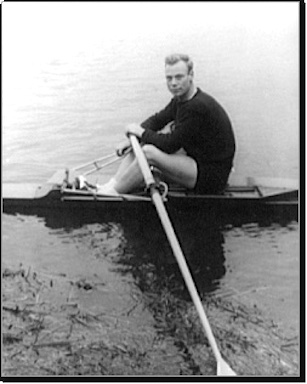
Sport: Rowing
Born: January 9, 1914
Died: January 13, 2008
Town: Bridgeboro, New Jersey
Joseph William Burk was born January 19, 1914 and grew up on an apple farm in Bridgeboro, NJ, a community within the town of Delran. Joe developed powerful arm strength as a teenager carrying 50-pound bags of apples down ladders. He became interested in rowing at the age of 16 after watching the 1930 collegiate championships. Joe developed an unusual upright rowing style practicing year-round on nearby Rancocas Creek.
Joe attended the University of Pennsylvania and became captain of the varsity. After graduating, he continued to compete for the Penn Athletic Club, specializing in single scull. Between 1937 and 1940, he won a remarkable 46 races in a row, captured four consecutive US championships, and became known as “The Robot Rower.” Joe’s younger brother, Jimmy, also rowed for Penn.
In 1939, Joe won the Sullivan Award as the nation’s top amateur athlete. He also won the Diamond Sculls at the Henley Royal Regatta in England twice; in 1938 he shattered the longstanding individual meet record by 8 seconds. His mark stood unchallenged until the 1960s. Upon his return from England, Joe rowed a “victory lap” on the Schuylkill River with throngs cheering him on both banks.
The rare oarsman who earned national fame, Joe was the odds-on favorite to edge Bobby Pearce for the gold at the 1940 Olympics in Helsinki after winning the nationals in Philadelphia. With the outbreak of World War II, however, he was denied a shot at glory.
Instead, Joe enlisted in the Navy and was given command of a PT boat in the South Pacific. In the winter of 1943–44, he led raids on Japanese shipping off New Guinea and New Britain, sending 26 enemy vessels to the ocean floor. Joe earned the bronze star, silver star and Navy Cross for his heroism and missions behind enemy lines. Joe’s brother, Jimmy, also skippered a PT boat during the war. Sadly, he was killed in a friendly-fire accident. Joe not only survived the war, he married Kay, the sister of his second in command.
Joe coached the Penn rowing team for 20 years starting 1950. He earned a reputation as an innovator, particularly in the area of weight-training and the use of electronic equipment to monitor the individual performance of his oarsmen. Among his protégés was Harry Parker, who led the team to the 1955 Grand Challenge Cup at Henley and later competed in the 1960s Olympics. Parker rowed one-on-one against Joe in practice and never beat him despite being 20 years younger.
Joe coached three varsity eight Intercollegiate Rowing Association championships in the late 60s and, in 1968, Joe assembled a crew of current and former Penn rowers for the Olympic trials. His team missed qualifying by .04 seconds.
Joe retired in 1970 and eventually moved to Scottsdale, Arizona. He passed away in 2008 at the age of 94. The Burk Cup is awarded to the winner of the annual competition between Penn and Northeastern.